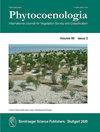Phytosociology and ecology of deciduous forests in Tajikistan (Middle Asia)
IF 0.9
4区 生物学
Q4 ECOLOGY
引用次数: 6
Abstract
Aims: To present the first syntaxonomical classification for the mesophilous deciduous forests of the PamirAlai Mountains in Tajikistan with some remarks on its environmental gradients. Location: Tajikistan. Methods: Altogether 201 relevés were sampled between 2008‒2013 using the seven-degree cover-abundance scale of Braun-Blanquet. They were classified by the modified TWINSPAN method using the four-step interval scale with cutoff levels of 0%, 2%, 5% and 10% and total inertia as a measure of cluster heterogeneity. Diagnostic species were identified using the phi coefficient as a fidelity measure. Detrendended Correspondence Analysis was used to determine the relation between samples, vegetation units and the major gradients in species composition. Results: Plant communities of typical broad-leaved, riparian and gallery woods inhabiting mainly the lowland, colline, montane and subalpine zone in several mountains and river valleys in the Pamir Alai Mts. are herein described. Numerical analyses of vegetation data resulted in the distinction of ten associations: Juglandetum regiae, Aceretum turkestanici, Violo suavis-Populetum albae, Swido darvasicae-Platanetum orientalis, Populetum pamiricae, Populetum talassicae, Salicetum turanico-pycnostachyae, Populetum pruinosae, Betuletum turkestanico-tianschanicae and Fraxinetum sogdianae, which have been assigned to four alliances: Acero turkestanici-Juglandion regiae for mesophilous broad-leaved forests, Populion afghanicae for montane riparian forests, Populion talassicae for subalpine riparian forests and Elaeagno-Populion pruinosae for gallery forests of the Middle Asian lowlands. The main factors determining the species composition of the studied associations are salinity, soil humidity, elevation, slope and aspect. Conclusions: Our first attempt initiates research on the diversity of forest vegetation in Tajikistan and Middle Asia. It provides the first classification scheme that could be used in further studies on forest vegetation in the surrounding regions, particularily in Middle and Central Asia.塔吉克斯坦(中亚)落叶森林的植物社会学与生态学
目的:首次对塔吉克斯坦帕米拉莱山脉中温落叶森林进行分类,并对其环境梯度作了评述。地点:塔吉克斯坦。方法:采用布朗-布兰凯7度覆盖丰度量表对2008-2013年201个相关人群进行抽样调查。采用改进的TWINSPAN方法进行分类,采用四步间隔量表,截断水平为0%,2%,5%和10%,总惯性作为集群异质性的度量。使用phi系数作为保真度度量来鉴定诊断种。采用非趋势对应分析确定了样品、植被单元与物种组成主要梯度之间的关系。结果:本文描述了帕米尔阿莱高原若干山地和河谷中主要分布于低地、丘陵、山地和亚高山地带的典型阔叶、滨水和廊林植物群落。通过植被数据的数值分析,划分出10个类群,分别是:胡桃木、土耳其石竹、紫罗兰-白杨、瑞士-东方platanetum、pamiricae、talassicae、turanicum - pynostachyae、pruinsae、土耳其石竹-tianschanicae和sogdianae。中温阔叶林为土耳其槭树- juglandion地区,山地河岸林为阿富汗槭树,亚高山河岸林为talassicae,中亚低地的廊道林为elaeagnopruinsae。盐度、土壤湿度、海拔、坡度和坡向是影响群落物种组成的主要因素。结论:本研究首次开启了塔吉克斯坦和中亚地区森林植被多样性的研究。它提供了第一个分类方案,可用于进一步研究周边地区,特别是中亚和中亚的森林植被。
本文章由计算机程序翻译,如有差异,请以英文原文为准。
求助全文
约1分钟内获得全文
求助全文
来源期刊

Phytocoenologia
生物-植物科学
CiteScore
2.60
自引率
0.00%
发文量
7
审稿时长
>12 weeks
期刊介绍:
Phytocoenologia is an international, peer-reviewed journal of plant community ecology. It is devoted to vegetation survey and classification at any organizational and spatial scale and without restriction to certain methodological approaches. The journal publishes original papers that develop new vegetation typologies as well as applied studies that use such typologies, for example, in vegetation mapping, ecosystem modelling, nature conservation, land use management or monitoring. Particularly encouraged are methodological studies that design and compare tools for vegetation classification and mapping, such as algorithms, databases and nomenclatural principles. Papers dealing with conceptual and theoretical bases of vegetation survey and classification are also welcome. While large-scale studies are preferred, regional studies will be considered when filling important knowledge gaps or presenting new methods.
 求助内容:
求助内容: 应助结果提醒方式:
应助结果提醒方式:


